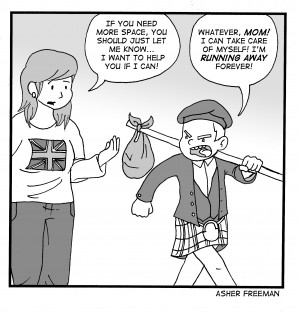 When one thinks of Scotland, few see it as a vitally-important entity on the world stage. In recent months, however, Scotland has risen to a heated topic in Europe and around the world because of the Scottish Parliament’s recent push for independence.
When one thinks of Scotland, few see it as a vitally-important entity on the world stage. In recent months, however, Scotland has risen to a heated topic in Europe and around the world because of the Scottish Parliament’s recent push for independence.
The Kingdom of Scotland itself, which has been a part of the United Kingdom for more than 300 years, is an integral part of the U.K.’s economy, culture and political sphere. The people of Scotland have always had a sort of independent streak much like that seen in California and Texas, and thus talk of independence is nothing new for the Scots. The actual move toward Scottish independence, however, has only come about in the past 20 years or so.
After a push from the conservative Labour Party, whose constituents are mostly Scots, Parliament enacted the Scotland Act of 1998. The act devolved many powers to the local Scottish government, including the right to have an executive authority and establish the Scottish Parliament in Edinburgh, Scotland’s capital.
With a stable government in place, the Scottish Parliament quickly began talks of full independence that spread like wildfire throughout the kingdom. By 2011, nearly a majority of native Scots approved of an independent Scotland.
The movement has thus culminated in the 2014 Scotland Independence Referendum. Today, Scots will head to the polls to decide the fate of not only an independent Scotland, but also the U.K., the European Union and all their allies.
If the referendum succeeds by garnering a majority “yes” vote, Scotland will actively begin cutting ties with the U.K. and forming new political ties with the United Nations, NATO and British allies such as the U.S.
Even if the referendum fails, Scotland will continue to move closer towards autonomy with a law that allows for the Scottish Parliament to levy taxes and enact economic policy without the approval of the U.K. Parliament or Downing Street.
Despite the great fervor seen in both camps concerning the referendum, concerns have arisen due to the fact that the vote is a majority rather than a supermajority. A supermajority is 75 percent of the total number of votes, while a majority is over 50 percent.
For the referendum, the U.K. Parliament opted for a majority vote rather than a supermajority. This is strange, given that similar legislation, such as the enaction of an amendment to the U.S. Constitution, requires a supermajority.
The Scots are a people that thrive on unity, and that unity will serve them well. Scotland has the economic strength, political solidarity and social willpower to operate effectively as an independent nation and on the world stage.
However, with entrance polls today showing a nearly 50/50 split between the two camps, having a 51 percent majority enact the measure could be disastrous for Scotland, Britain and its allies.
If an independent Scotland is created under these conditions, nearly half of the country’s population will be forced to accept a referendum they did not want. With both camps as divided as they are, it is hard to tell whether the two parties will be able to get along in the newly formed state.
The idea of an independent state peacefully forming from a developed nation is something unprecedented in our age, and few know exactly what implications this will have for the future of Scotland itself. Unlike the dissolution of the Soviet Union in 1991, a divide that developed out of a breakdown of political stability, Scotland is delving into completely uncharted territory in its move toward full independence.
The Scots are a people with a streak of fervor and loyalty for their homeland, and many feel that a Scotland free from British rule is best for cultivating this sense of unity in its people.
However, the Scots should be careful to vote with common sense in mind over pride for their homeland.



